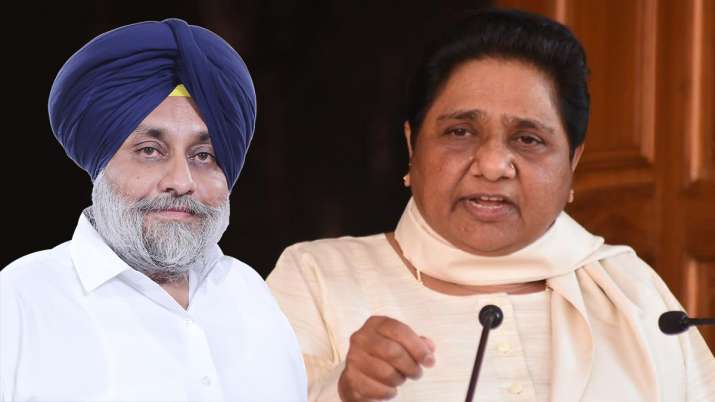
The Shiromani Akali Dal (SAD) and Mayawati’s Bahujan Samaj Party (BSP) are expected to forge an alliance for next year’s Punjab assembly elections. According to insiders, the alliance’s final statement is expected on Saturday.
Sukhbir Singh Badal, the president of the Akali Dal, and Satish Mishra, the General Secretary of the BSP, arrived in Chandigarh on Friday and are likely to conduct a joint news conference on Saturday to announce the agreement.
The Akali Dal and the BSP are reuniting 27 years after their alliance won 11 of Punjab’s 13 seats in the 1996 Lok Sabha elections. The BSP, led by Mayawati, had then won all three seats it had fought, while the Akali Dal had won eight of the ten seats.
The Akali Dal is willing to grant the BSP 18 seats, according to reports. Last year, the Akali Dal withdrew from the BJP-led NDA over new farm laws.
The partnership would undoubtedly alarm Arvind Kejriwal’s Aam Aadmi Party (AAP), which has been striving to establish itself as a significant force in the state, edging away both the SAD and the BJP.
On the other side, the BSP, which has nothing to offer in Punjab, would be hoping that its alliance with the Akali Dal brings some advances to the northern state.
In September of last year, the Akali Dal withdrew from the NDA over three agriculture laws, which sparked a storm of protests from farmers, especially from Punjab and Haryana. Harsimrat Kaur Badal, the lone Akali minister in Prime Minister Narendra Modi’s cabinet, resigned as the legislation were being tabled in the Lok Sabha. The minister, who was a member of the cabinet that approved the measure, was widely chastised throughout the state.
Sukhbir Badal resigned the NDA a week later, calling the proposals “lethal and devastating” for the NDA’s main voting base of farmers.
In the 2017 assembly elections, the Akali Dal and the BSP, which were battling alone in the state, witnessed a drop in vote share when compared to the 2007 elections. The Akali Dal-BJP coalition took power in 2007, but was deposed in 2017 by the Congress, which secured an absolute majority in the state by capturing 77 seats.
The AAP, which rose to prominence in the 2017 elections, received 23.7 percent of the vote, while the BJP’s vote share fell from 8.28 percent in 2007 to 5.4 percent in 2017.




